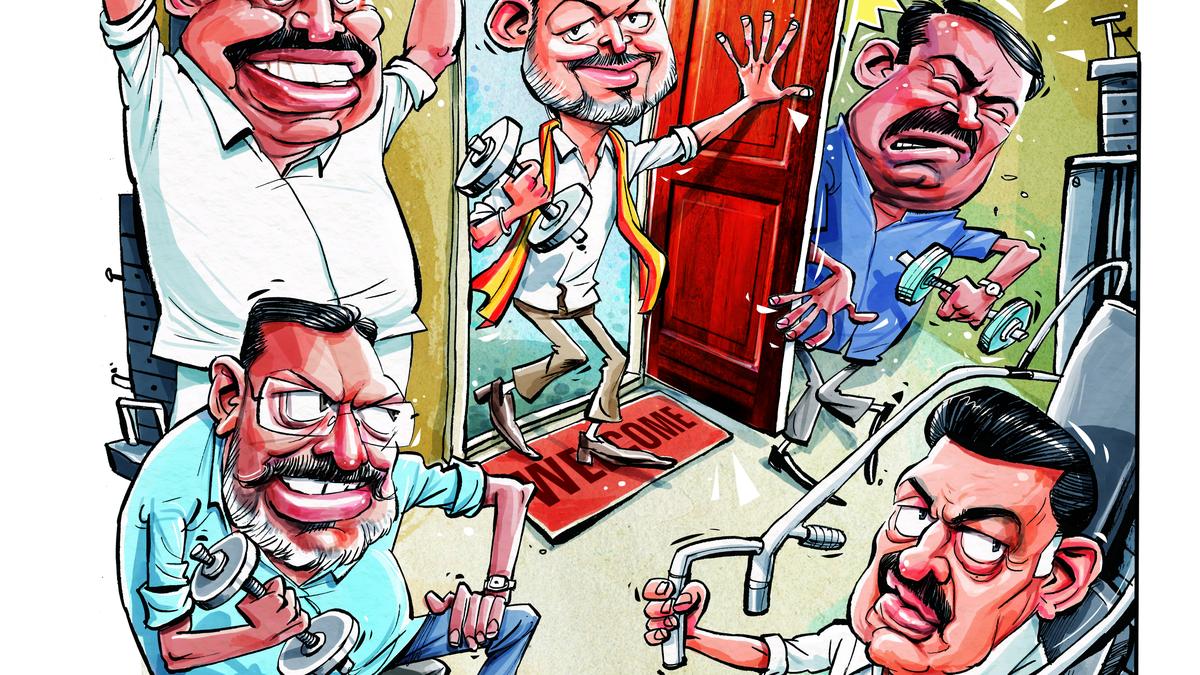
Pre-election hustle
The Hindu
Tamil Nadu's political landscape post Lok Sabha election sees heightened activity, realignments, and power-sharing discussions for the 2026 Assembly election.
The period immediately after the Lok Sabha election would have usually been one of calm, since the Assembly election in Tamil Nadu is at least one-and-a-half years away. But this time, the State appears to have become an exception to this norm. For the last couple of months, there has been a rumble in the jungle. There has been heightened political activity, unusual for the season. The State has already been in the midst of parleys on possible realignments and share in power, despite its record of last-minute crossovers of parties from one camp to another. At least, two such examples can be cited. When seat-sharing was finalised for the 1989 Assembly election, the Communist Party of India (CPI), irked by the offer of the Dravida Munnetra Kazhagam (DMK), went over to the coalition headed by the Jayalalithaa faction of the All India Anna Dravida Munnetra Kazhagam (AIADMK). It contested in 13 constituencies and won in three. Seventeen years later, the Marumalarchi Dravida Munnetra Kazhagam (MDMK), which was part of the DMK-led front in the 2004 Lok Sabha election, suddenly joined hands with the AIADMK and won six of the 35 Assembly constituencies it contested.
No observer is ruling out such a possibility now. But the question is, as always, about the impact of such eventualities. An AIADMK veteran, who is staying away from active politics, says, “There may be a depreciation in the DMK camp, but the front will continue by and large, even if it comes under [Deputy Chief Minister] Udhayanidhi [Stalin].” He goes on to assert that the DMK will remain a principal force, though he feels that youngsters are no longer attracted towards the present crop of leaders of the AIADMK and the DMK.
The ongoing debate on realignment, fresh alignment, and power-sharing has been necessitated, to certain extent, by the recent entry of film actor Vijay into the political arena. At the maiden State conference of the Tamilaga Vettri Kazhagam (TVK) at Vikravandi, about 160 km south of Chennai, late last month, he made an offer that tempted many other parties to react in one form or the other. “I will be open not only to formation of an alliance with other parties but also to a share in power in the event of victory in the 2026 Assembly election,” he said. The ruling DMK and the BJP are not among the “other parties” as of now because they are, in his words, political and ideological adversaries of his party. The DMK accused the TVK of being the “C team” of the BJP. On his part, convener of the coordination committee of the BJP State unit and former MLA H. Raja advised the actor to join the DMK, after one of the resolutions that the TVK adopted at the first meeting of its executive earlier this month accused the Union government of “imposing” a third language on Tamil Nadu.
The AIADMK, which has been facing one electoral setback after the other in the last five years, is naturally warm towards Mr. Vijay as he can be one of its potential allies. In his speech, Mr. Vijay too did not target the AIADMK. Determined not to rub him the wrong way, the principal Opposition party, which has been against power-sharing like its traditional rival DMK, made no comment on Mr. Vijay’s idea of a coalition government. A couple of days after the October 27 meeting of the TVK, AIADMK general secretary and former Chief Minister Edappadi K. Palaniswami, while interacting with journalists at the party headquarters in Chennai, did not want to get drawn into any discussion on the issue. He merely pointed out that the actor had just started his party, held the first State conference, and stated his position. “It would not be proper on my part to state whether his stand is right or wrong,” he said.
The AIADMK is not alone in anticipating a realignment. R. Kannan, adjunct professor at the University of Georgia School of Law, Athens, Georgia, U.S., foresees the kind of realignment that took place in 2011 when Jayalalithaa aligned with Desiya Murpokku Dravida Kazhagam (DMDK) founder Vijayakanth to take on the DMK. At the same time, he does not rule out the possibility of a more fragmented field.
Notwithstanding such an optimistic view, the AIADMK, according to Congress leader A. Gopanna, would not become part of Mr. Vijay’s coalition. “It seems that he [the TVK founder] is keen on heading the alliance. How would they [AIADMK] join such a front,” he asks. Not only the AIADMK but also many other parties would not consent to be the TVK’s allies as Mr. Vijay is an “untested, unproven player”. While acknowledging that the TVK leader has demonstrated his capacity to mobilise people, “mostly youth and his fans”, the Congress leader observes, “Electoral politics is a different ball game.”
The TVK chief’s offer did not come on its own. A few weeks earlier, the Viduthalai Chiruthaigal Katchi (VCK) sought a share in power. However, Aadhav Arjuna, who joined the party recently, later clarified that the demand should not be construed as an attack on the DMK-led alliance. The VCK’s office-bearer had only echoed the view of party founder Thol. Thirumavalavan, who had been talking up the demand ever since his party entered electoral politics in 1999.

Udupi-Chikkamagaluru MP Kota Srinivas Poojary said on Saturday that the State government has decided to reject the Centre’s fresh draft notification on Kasturirangan committee report on conservation of the Western Ghats. Hence, people’s apprehension on the implementation of the report is unnecessary.










